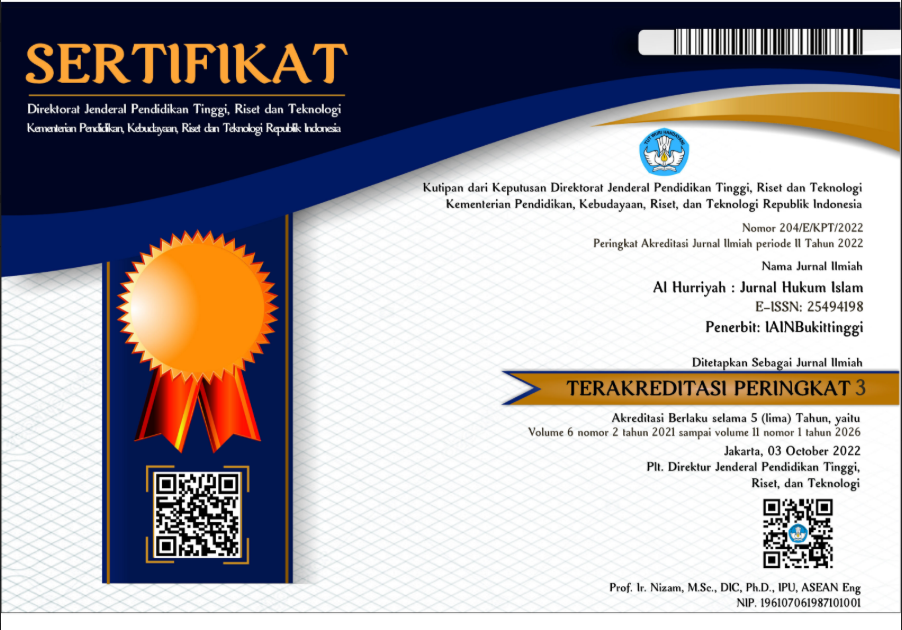Memaknai Perolehan Rezki dalam Hukum Ekonomi Syariah
DOI:
https://doi.org/10.30983/alhurriyah.v5i2.3613Keywords:
Rezki, Ethics of Islamic Economic Law, Sharia Economic Law.Abstract
Islam as a religion that has universal teachings, not only talks about aqidah as the main foundation of people in adhering to religion, but also teaches good relations among humans (muamalah). In Islam, the discussion of economics cannot be separated from the concept of sustenance, some people assume that sustenance is identical to property, because economic activity is an activity to fulfill material needs or property (al-Mal) as a life support. Economic activity is an effort to fulfill basic human needs in order to worship Allah SWT. Therefore, it must be ensured through the rules and methods justified by sharia. Although in principle various types of muamalah are permitted, the concept of usury is strictly not justified in sharia economic law, so it must also be ensured that in meeting daily needs, Muslims must obey these limits and provisions. The method used in this paper is to reveal the meaning of the limitations (arguments) of the Qur'an and Sunnah regarding the acquisition of sustenance then analyzed based on the sociological ethical aspects of Islamic economic law activities. And in this paper the activities of usury and gharar are one of the enemies of Islamic economics in the perspective of Islamic law.
Islam sebagai suatu agama yang memiliki ajaran universal, tidak hanya bicara tentang aqidah sebagai pondasi utama umat dalam menganut agama, tapi juga mengajarkan hubungan baik sesama manusia (muamalah). Dalam Islam, bahasan ekonomi tidak terlepas dari konsep rezki, sebagian masyarakat mengasumsikan bahwa rezki identik dengan harta, karena kegiatan ekonomi merupakan aktifitas pemenuhan kebutuhan material atau harta (al-Mal) sebagai penyangga kehidupan. Aktifitas ekonomi merupakan usaha pemenuhan kebutuhan dasar manusia dalam rangka menjalankan ibadah kepada Allah SWT. Oleh karenanya mesti dipastikan melalui aturan dan cara yang dibenarkan syariah. Sekalipun pada prinsipnya, berbagai jenis muamalah dibolehkan. Konsep riba dengan tegas tidak dibenarkan dalam hukum ekonomi syariah, maka harus dipastikan pula dalam pemenuhan kebutuhan sehari-hari, umat Islam harus patuh pada batas dan ketentuan tersebut. Metode yang digunakan dalam tulisan ini ialah dengan mengungkap makna batasan (dalil) dari al-Qur`an dan Sunnah tentang perolehan rezki, kemudian dianalisis berdasarkan aspek etik sosiologis aktifitas hukum ekonomi Syariah. Dan dalam tulisan ini, aktifitas riba dan gharar menjadi salah satu musuh ekonomi dalam persepktif ekonomi syariah.
References
Al-Alusi. Ruhul Ma’ani fi Tafsir al Qur’an al-Azim. Maktabah al-Syamilah.
Al-Kaaf, Abdullah Zaki. 2002. Ekonomi Dalam Prespektif Islam. Bandung: Pustaka Setia.
Al-Naisaburi, Abu Husain Muslim Ibn Hajjaj al-Kusairi. 2007. Shahih Muslim. Beirut: Dar al-Fikri.
Al-Thabari, Abu Ja’far. 2000. Jami’ al-Bayan fi ta’wi al-Qur’an. Beirut: Mu’assasah al-Risalah.
Aprianto, Naerul Edwin Kiky. 2016. Kebijakan Distribusi Dalam Pembangunan Ekonomi Islam. Jurnal Al-Amwal. Vol. 8. No. 2.
Bahsoan, Agil. 2011. Mashlahah Sebagai Maqashid al-Syariah (Tinjauan dalam Perspektif Ekonomi Islam), Jurnal Inovasi. Vol.8. No.1.
Baidowi, Aris. 2011. Etika Bisnis Perspektif Islam, Jurnal Hukum Islam (JHI) Vol.9, No.2, Desember.
Harun, Nasrun. 2007. Fiqh Mu'amalah. Jakarta: Gaya Media Pratama.
Iskandar, Azwar, Khaerul Aqbar. 2019. Reposisi Praktik Ekonomi Islam: Studi Kritis Praktik Ekonomi Islam Di Indonesia. Jurnal Nukhbatul ‘Ulum: Bidang Kajian Islam Vol. 5. No.1.
Karim, Adiwarman A dan Oni Sahroni. 2015. Riba, Gharar dan Kaidah-kaidah Ekonomi. Jakarta: Raja Grafindo Persada.
Karim, Azwar Adiwarman. 2004. Sejarah Pemikiran Ekonomi Islam. Jakarta: Raja Grafindo Persada.
Lubis, Ibrahim. 1994. Ekonomi Islam Suatu Pengantar. Jakarta: Kalam Mulia.
Martinelli, Ida 2018. Menelisik Dimensi Etika Dalam Kegiatan Ekonomi Menurut Perspektif Islam. Jurnal Edu Tech Vol. 4 No.1 Maret.
Medias, Fahmi. 2010. Wakaf Produktif Dalam Perspektif Ekonomi Islam. Jurnal Ekonomi Islam. Vol. IV. No.1.
Mulyani, Sri. 2020. Pentingnya Ekonomi Syariah Bagi Perekonomian Global. Jakarta: Tempo.
Nur, Efa Rodiah. 2015. Riba Dan Gharar: Suatu Tinjauan Hukum Dan Etika Dalam Transaksi Bisnis Modern. Jurnal al-‘Adalah Vol. XII. No. 3. Juni.
Qardhawi, Yusuf. 1995. Norma dan Etika Ekonomi Islam, Judul Asli: Daur al-Qayyim wa al-Akhlaq fi al-Iqtishadi al-Islami, Penterjemah: Zainal Arifin. Jakarta: Gema Insani.
Sabiq, Sayyid. Fiqh Sunnah. Beirut: Dar al-Fikri. Tt.
Sholahuddin. 2007. M. Asas-Asas Ekonomi Islam, Jakarta: Raja Grafindo Persada.
Downloads
Additional Files
Published
Issue
Section
Citation Check
License
Authors who publish with this journal agree to the following terms:
- Authors retain copyright and grant the journal right of first publication with the work simultaneously licensed under a Creative Commons Attribution-ShareAlike 4.0 International License that allows others to share the work with an acknowledgment of the work's authorship and initial publication in this journal.
- Authors are able to enter into separate, additional contractual arrangements for the non-exclusive distribution of the journal's published version of the work (e.g., post it to an institutional repository or publish it in a book), with an acknowledgment of its initial publication in this journal.
- Authors are permitted and encouraged to post their work online (e.g., in institutional repositories or on their website) prior to and during the submission process, as it can lead to productive exchanges, as well as earlier and greater citation of published work (See The Effect of Open Access).





